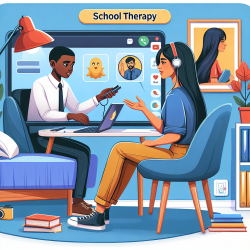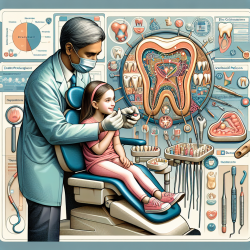Introduction
In the realm of maternal health, the impact of adverse childhood experiences (ACEs) is profound and far-reaching. Recent research titled "Personalized Mobile Health-Enhanced Cognitive Behavioral Intervention for Maternal Distress: Examining the Moderating Role of Adverse Childhood Experiences" sheds light on how personalized interventions can significantly improve maternal mental health outcomes. This blog explores how practitioners can leverage these findings to enhance their therapeutic approaches, ultimately benefiting both mothers and their children.
Understanding the Study
The study conducted between August 2019 and August 2021 involved 100 pregnant individuals, with a focus on those with a history of ACEs. Participants were divided into two groups: one receiving the Mothers and Babies Personalized (MB-P) intervention and the other receiving standard prenatal care. The MB-P intervention, enhanced with personalized mobile health technology, aimed to reduce maternal distress through cognitive behavioral therapy (CBT) and mindfulness practices.
Key Findings
- Participants without ACEs showed significant improvement in depressive symptoms and perceived stress compared to those with ACEs.
- The intervention was effective in reducing prenatal distress for all participants, but those with ACEs may benefit from enhanced trauma-informed content.
- Longitudinal analysis indicated that individuals without ACEs experienced greater and more sustained benefits from the intervention.
Implications for Practitioners
For practitioners, these findings underscore the importance of tailoring interventions to account for a patient's history of ACEs. Here are some actionable steps:
- Incorporate Trauma-Informed Practices: Enhance existing interventions with trauma-informed content to address the unique needs of individuals with ACEs.
- Utilize Mobile Health Technologies: Leverage personalized mobile health tools to provide real-time support and feedback, enhancing the effectiveness of interventions.
- Focus on Emotional Regulation: Prioritize strategies that improve emotional regulation, as this is a critical factor in managing distress and improving outcomes.
Encouraging Further Research
While the study provides valuable insights, it also highlights the need for further research. Future studies should explore:
- The long-term effects of personalized interventions on maternal and child health.
- The impact of different types of ACEs on intervention outcomes.
- How interventions can be adapted for diverse populations with varying levels of ACE exposure.
Conclusion
The study's findings offer a promising avenue for improving maternal health outcomes through personalized interventions. By integrating trauma-informed practices and leveraging mobile health technologies, practitioners can enhance the effectiveness of their interventions, ultimately leading to better outcomes for mothers and their children.
To read the original research paper, please follow this link: Personalized Mobile Health-Enhanced Cognitive Behavioral Intervention for Maternal Distress: Examining the Moderating Role of Adverse Childhood Experiences.










